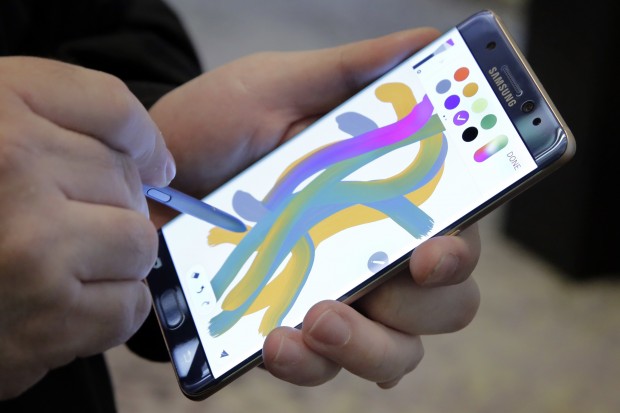Why Samsung should worry?

FILE – In this July 28, 2016, file photo, a color blending feature of the Galaxy Note 7 is demonstrated in New York. An overheated Samsung device created smoke that caused a plane to be evacuated at Louisville International Airport on Wednesday, Oct. 5, 2016 an official said. The smoke prompted Southwest Airlines to evacuate the plane before it departed for Baltimore, Louisville Metro Arson Capt. Kevin Fletcher told news outlets. (AP Photo/Richard Drew, File)
John Burton – The Korea Times
If I was at Samsung Electronics, I would be worrying about how the issue of exploding batteries with the Galaxy Note 7 has become comic fodder for late night TV shows in the U.S.
“There was a terrible terrorist attack last weekend in New York, New Jersey. No one died, that’s the good news. And, boy, were we lucky because the bomb was made from acid, ball bearings and electronic igniters. It was either that or a sackful of Samsung phones,” Bill Maher joked on his HBO show, Real Time.
“I have a special message for anyone watching tonight’s show who watching this on a Samsung Galaxy Note 7 – run for your lives,” said Stephen Colbert on his popular CBS show, The Late Show, about the smartphone that enjoyed great popularity because of its curved, waterproof and iris-scanning features until the battery problem emerged.
“It’s literally a burner phone,” Colbert continued, while noting some customers were still using the phone. “Just what kind of person uses a phone when they’ve been told it’s dangerous? Here to tell us, please welcome live by satellite, a loyal Samsung customer.” Cut to stock video of a stuntman on a fire with the following voiceover. “Thanks for having me, Stephen. The Galaxy 7 is working great. I loved the curved glass,” he proclaims as the flames consume him.
When Samsung first reported the problems with the phone battery at the beginning of September, most equity analysts in Seoul were sanguine about the impact on the company. They said that as long as Samsung responded quickly to the problem, the incident should not hurt its brand image, adding that many new smartphone models encounter problems.
Analysts noted that Samsung was not the first smartphone to have battery safety issues. Apple earlier this year had to recall adopters sold in Europe after there were reports that some were delivering electric shocks.
Moreover, Samsung rapidly acknowledged the problem and ordered a recall of at least 2.5 million Galaxy Note 7 smartphones in 10 countries and offered refunds or replacement devices with safe batteries in what one analyst described as “an abundance of caution.”
Nonetheless, the meme of “exploding Samsung phones” has taken off as shown by the references on late night U.S. TV shows, which are watched by Samsung’s core millennial customers in one of its major markets.
Part of the problem is that Samsung appears to have fallen victim to sensational news stories that ignore the fact in their click-baiting headlines that it is defective lithium-ion batteries, not the phone themselves, which exploded. Hundreds of millions of lithium-ion batteries are manufactured each year, but relatively few catch fire, and recalls of defective lithium-ion batteries by consumer electronics companies are not uncommon.
It can be argued that lithium-ion battery fires or so rare, that when they do happen they make the news. And in a perverse way, Samsung’s recall just increased attention although it was the right thing to do.
But the image of “unsafe” Samsung phones has been reinforced by warnings and outright bans by airlines on charging the Note 7 on their aircraft and requesting passengers to immediately turn off the phones after embarking.
Unfortunately, the way the recall has been conducted has added to Samsung’s problems. Customers receiving replacement phones have complained about overheating and the rapid loss of battery power, undermining market confidence Samsung has managed the recall properly.
Meanwhile, sporadic reports of Note 7 phones bursting into flames in China, where Samsung did not order a recall because it deemed the battery models there to be safe, has also damaged its reputation in a country where it has suffered a loss in market share.
Analysts noted that Samsung appeared to announce the recall plans before working out how millions of customers would get their replacements, while failing to coordinate with regulators in the U.S. The recall stumbles hint at a possibly deeper problem at Samsung, one which it has not acknowledged.
This is the rush to get the Note 7 into the global market before the iPhone 7. Bloomberg News recently reported that top Samsung executives believed that the anticipated iPhone 7 was mediocre and thought Samsung could steal a march on its American rival by pushing suppliers to meet unusually tight deadlines despite a host of new features. This is a throwback to the “pali, pali” culture in Korea that led to shortcuts in the production of everything from cars to buildings, sometimes with disastrous results.
If such is the case, Samsung Electronics then needs to bear a large share of the responsibility for the customer blowback. Recent reports in the U.S. that some of its washing machines have also exploded will not help its cause.

























































